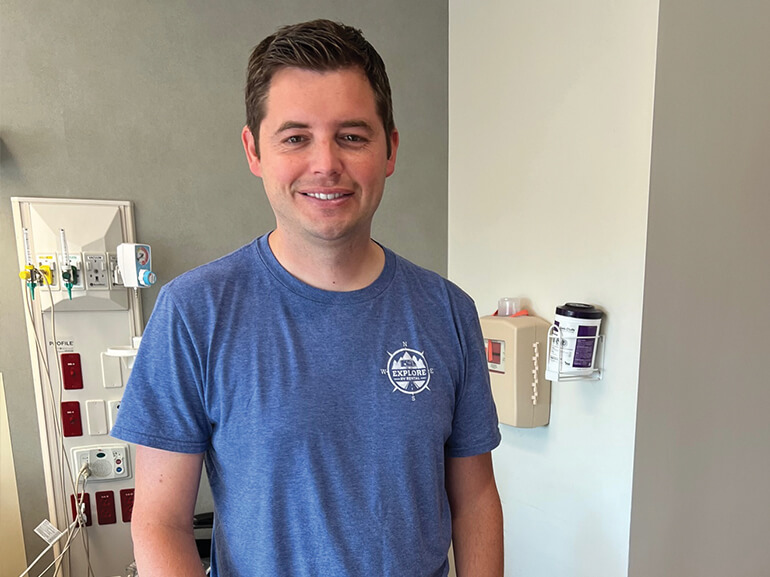Joshua's story

Joshua Curtis, 35, grew up near Wilmington, Ohio and currently lives in Lebanon, Ohio with his wife, Jenna, and their two young children. His childhood dream was to fly planes and he started piloting at age 14. Immediately after high school, Joshua joined the Air National Guard and served in the military for over 16 years, most recently as an aviator in the US Air Force. Joshua also owns an RV rental business and is active in his church, serving on the disaster response team. He and his family enjoy going on cruises, and their favorite place to visit is Bermuda.
After a day at the movies with his son to see “Top Gun,” Joshua experienced symptoms of vertigo on the drive home. He called his wife and his neighbor, both nurses, and they observed on his Apple watch that his heart rate was irregular. His tongue also started to feel numb. Concerned he was having a stroke, Jenna drove him to the emergency department at their local hospital. At the hospital, medical staff followed stroke protocol and did a CT scan. The scan revealed a mass, so he was transferred by ambulance to a larger hospital for an MRI. That test revealed a tumor on the right frontal lobe of his brain, which was biopsied for confirmation and later revealed to be cancerous. Surgery was scheduled, and the family went on a trip to Disney World together before the surgery date.
While recovering from surgery in the hospital, Joshua was promoted in a video conference-enabled ceremony to Master Sergeant. He was also recognized at the Western Southern Open tennis event, where his son participated in the ceremonial coin toss to start the tournament and Jenna and the children accepted an award on his behalf.
Since the tumor and surgery were on the right side of his brain, Joshua experienced weakness and deficits on the left side of his body. Immediately following surgery, he could only slightly move his fingers on his left hand and everything else on the left side of his body was paralyzed. After spending a week in the neuro unit, he choose TriHealth Rehabilitation Hospital to continue his recovery because it was highly recommended and close to home.
When he admitted to TriHealth Rehabilitation Hospital, Joshua couldn’t walk or use his left arm or leg. He was also dependent on others for help with activities of daily living such as getting out of bed, going to the bathroom, brushing his teeth and getting dressed. Although doctors cautioned that he may never walk again, Joshua set a goal of walking out of TriHealth Rehabilitation Hospital with a cane.
In physical therapy, the team first worked on conditioning therapies and neuromuscular re-education. When Joshua was able to stand, his therapists manually lifted and moved his left leg while he held unto a railing in the hallway. This soon progressed to Joshua being able to use a hemi-walker, a special kind of walker designed for individuals with one-sided weakness, as he gained strength on his left side. His therapists also used neuromuscular electrical stimulation, a LiteGait body support system while he walked on a treadmill, and an Ekso skeleton wearable robotic device. These rehabilitative technologies all helped strengthen Joshua’s brain-body connection and increase his coordination and mobility. Joshua excelled in all therapies and described his experience with the Ekso: “I felt superhuman in the Ekso! I noticed immediate positive results after the first couple sessions.”
In occupational therapy, Joshua used technology-driven therapeutic games to improve his visual-spatial deficits on his left side. His therapist also worked with him on his activities of daily living to increase independence. Joshua expressed his appreciation of his therapists and the support staff saying, “I love how passionate everyone is about their job at TriHealth Rehabilitation Hospital. Everyone is so encouraging.”
Jenna’s presence in therapy every day was a tremendous support to Joshua. He shared, “My wife Jenna has been my cheerleader throughout the process, and I was very grateful that she was by my side during all my therapy sessions.” He also has a strong faith, and he expressed that his faith in God sustained him during his lowest points and gives him hope for the future.
After eighteen days at TriHealth Rehabilitation Hospital, Joshua achieved his goal of walking the entire length of the hallway with a cane, a distance of 170 feet. He also significantly increased his strength and abilities related to self-care and was able to accomplish tasks such as eating a muffin and putting on deodorant with his left hand.
With these successes, he was ready to go home and was most looking forward to snuggling up with his wife and kids on the couch and watching cartoons. He plans to continue rebuilding strength with home and outpatient therapies as he prepares for the next steps in his health journey including radiation and chemotherapy.